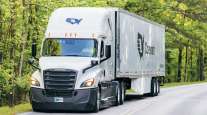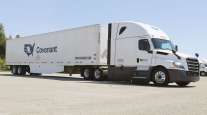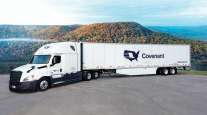Covenant CEO Says Truckers Willing to Pay to Upgrade Highways

The head of one of Chattanooga, Tennessee’s biggest trucking companies says there is an urgent need to upgrade the interstate highways in the Chattanooga region to keep commerce flowing.
"I promise you there is a train wreck — I won't say truck wreck — on the horizon," Covenant Transportation Group CEO David Parker told regional leaders gathered Dec. 6 for the annual "Thrive 2055" luncheon. "We just can't keep doing what we're doing and not think it's going to hurt the U.S. economy."
Parker, the founder of one of America's biggest trucking companies and a board member of American Trucking Associations, said the trucking industry is willing to pay higher gasoline and diesel taxes to help upgrade America's highways and reduce the growing problem of traffic congestion. Traffic backups on highways already cost the U.S. trucking industry $9.2 billion in 2013, or more than $4,100 a year for the typical Covenant truck driver.
Covenant ranks No. 43 on the Transport Topics Top 100 list of the largest U.S. and Canadian for-hire carriers.
"The thing that makes me mad is that we have told Washington and we have told the states, including Tennessee, Georgia and Alabama, we will pay for these road improvements," Parker said. "Raise my fuel taxes."
Parker said trucks are the lifeline for the e-commerce economy of today.
"Eighty percent of all goods are hauled by truck, and I promise you if all of the trucks stopped moving, within 72 hours you would have nothing to eat or to wear, and you'd soon be sitting at home because you would have no gas," he said.
Parker's message to the 16-county regional planning group known as Thrive 2055, which he said he delivered rather than traveling to New York to appear on CNBC, helped launch what Thrive leaders said will be a "Year of Transportation" for the group in 2017. In the next year, Thrive plans to focus on ways to figure out new approaches and solutions for moving people and freight across and through southeast Tennessee, northwest Georgia and northeast Alabama.
"We take travel for granted, but it is something that is essential to our way of life," said Bridgett Massengill, executive director of Thrive 2055. "We're a region with the highest volume of freight through traffic of any metropolitan area in the country. That is only going to grow with the expanded Panama Canal and Savannah Port in Georgia."
In the Chattanooga region, 87% of all workers drive to their jobs alone in their own car, and only 3% currently work at home, Massingill said. Less than 1% of more than 1 million people in the Chattanooga region use public transportation.
"We hate sitting still in traffic, losing productivity time or precious time with our family," Massingill said that Thrive surveys show.
Parker said his commute from Covenant's headquarters in Lookout Valley to his home in Ringgold, Ga., typically takes 50 minutes and is often delayed by traffic jams on interstates 24 and 75.
The Covenant CEO said fuel and other taxes paid by trucks "have paid to build our roads four times over," but he said truckers are willing to pay higher fuel taxes to pay for better roads "as long as we know the taxes we pay go into the highway trust fund" and will be used to improve interstate highways.
Federal gasoline taxes have not been raised since 1993, and Tennessee has not raised its gasoline tax rate since 1989. Tennessee's current gasoline tax rate of 21.4 cents is the 11th lowest among the 50 states, according to a new study by the Boyd Center for Business and Economic Research at the University of Tennessee.
President-elect Donald Trump has pledged his support for a $1 trillion infrastructure program to fix America's roads, bridges, airports and ports. He has not outlined how he would pay for such improvements.
In Tennessee, Gov. Bill Haslam could ask the Legislature next year to increase the state's gasoline tax to better fund Tennessee roads.
As lawmakers debate whether to raise taxes, Thrive officials said they will examine transportation alternatives and improvements that make the most sense for the Chattanooga region, including whether an I-75 bypass around Chattanooga should be built.
"They have been talking about a bypass around Chattanooga since I was a boy," the 58-year-old Parker said. "I may not live long enough to see it."
But Parker said a bypass route would help ease much of the congestion around the I-24 and I-75 intersection, where the interstate highways narrow to only two lanes in each direction and traffic often backs up.
Regional government and business leaders previously have debated whether a bypass is feasible and needed to cope with the worsening traffic problems in the region. To date, no consensus has been reached.
Thrive 2055, which was created in 2013 to help study and coordinate training, transportation and economic development efforts in the 16 counties in and around Chattanooga, includes 79 local governments in three states and 16 counties. After three years of planning and study, the regional planning group has agreed to focus on transportation in the year ahead.
Connie Vaughan, the transition chairwoman for Thrive, urged members and the public to join the 2017 Thrive Transportation Collaborative to study and discuss the future of transportation.




